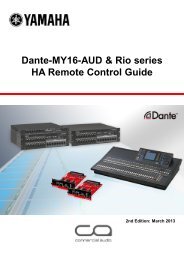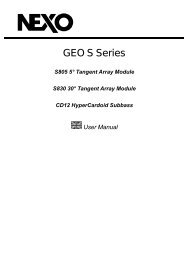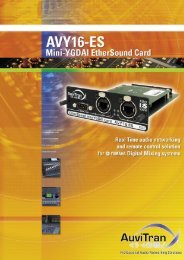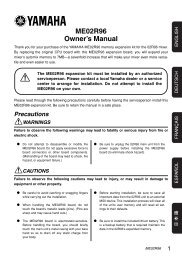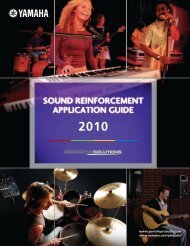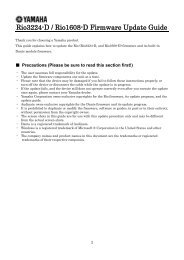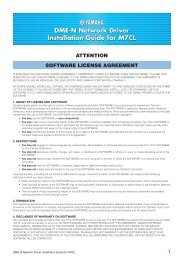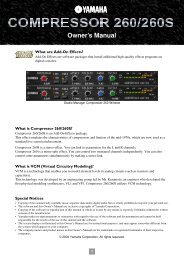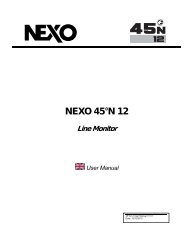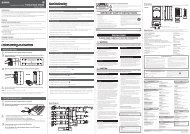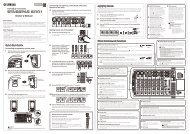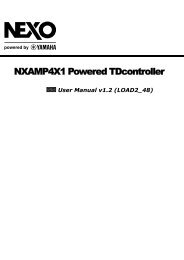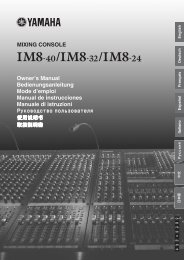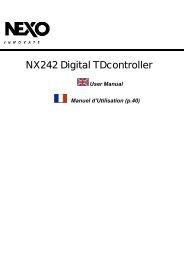M7CL Quick Start Guides.
M7CL Quick Start Guides.
M7CL Quick Start Guides.
Create successful ePaper yourself
Turn your PDF publications into a flip-book with our unique Google optimized e-Paper software.
Preparing the console before you start.<br />
<strong>M7CL</strong> <strong>Quick</strong> <strong>Start</strong> Guide Part 1<br />
Check your console firmware version.<br />
This guide relates to <strong>M7CL</strong> Version 3 console firmware. If you<br />
have older firmware we recommend an upgrade to version 3. The<br />
firmware can be freely downloaded from www.yamahaproaudio.<br />
com>>Downloads.<br />
V3.xx<br />
V3.xx<br />
Scene 000 or Initialization<br />
Before working on an analogue console it is customary to check that the console has been “set to zero”. This<br />
normally means setting the gain to minimum, the EQ to flat, auxes to flat, group routing de-selected, insert points<br />
switched off, etc. Look at and check upwards of 1000 knobs! Because <strong>M7CL</strong> can memorise its settings, Yamaha have<br />
provided a handy memorised scene (Scene000) where the console is set to zero ready to start at the touch of a<br />
button.<br />
Scene 000<br />
To recall Scene 000 press the up/down keys until SCENE<br />
000 flashes in the [Scene Panel]. Then press [RECALL]<br />
However certain features of <strong>M7CL</strong> are not under scene control. For example word clock settings, Outport settings<br />
and User Defined Keys are not recalled by scene control. Also, as we will explore in later parts of the User Guide<br />
various things normally controlled by scenes can be actively removed from scene control. This can mean that<br />
recalling Scene 000 does not “set to zero” as expected. Returning the whole console to factory default setting is<br />
called “Initialization” and this is recommended when starting a completely new project.<br />
Note; Initialization removes all user settings from the console and so should only be done if any valuable<br />
user data on the console is backed up. (To a USB memory key or Studio Manager/<strong>M7CL</strong> Editor file on a PC).<br />
Tip; Users, particularly in fixed installs, may wish to create their own “Session <strong>Start</strong>ing Point” saved to a<br />
USB key rather than using the factory default. This “Session <strong>Start</strong>ing Point” could include correct port delays<br />
and output patching.<br />
Not included in Scene recall. (So not reset by Scene 000)<br />
but still remembered for all scenes.<br />
User defined keys<br />
Preferences<br />
Brightness controls<br />
OUTPORT delay and level settings<br />
MIDI setup<br />
Wordclock<br />
Master +48V<br />
CUE Pop-up; PFL trim ins, DCA trim, PFL trim Outs<br />
Monitor Pop-up; (levels, source on/off, mono, link)<br />
Oscillator (all parameters)<br />
Safe assignments (mute, recall)<br />
Passwords/Admin/guest settings<br />
Screen page or pop-up<br />
5<br />
Sends on fader selected<br />
Metering point selection<br />
External HA to Slot assignment and HPF.<br />
User Access Level<br />
Network settings<br />
Clock!!<br />
Slots and MY Card settings<br />
User Libraries<br />
EQ/HPF, (User and ROM)<br />
Dynamics (not key-in), (User and ROM)<br />
GEQ, (User only)<br />
Effects (User and ROM)



